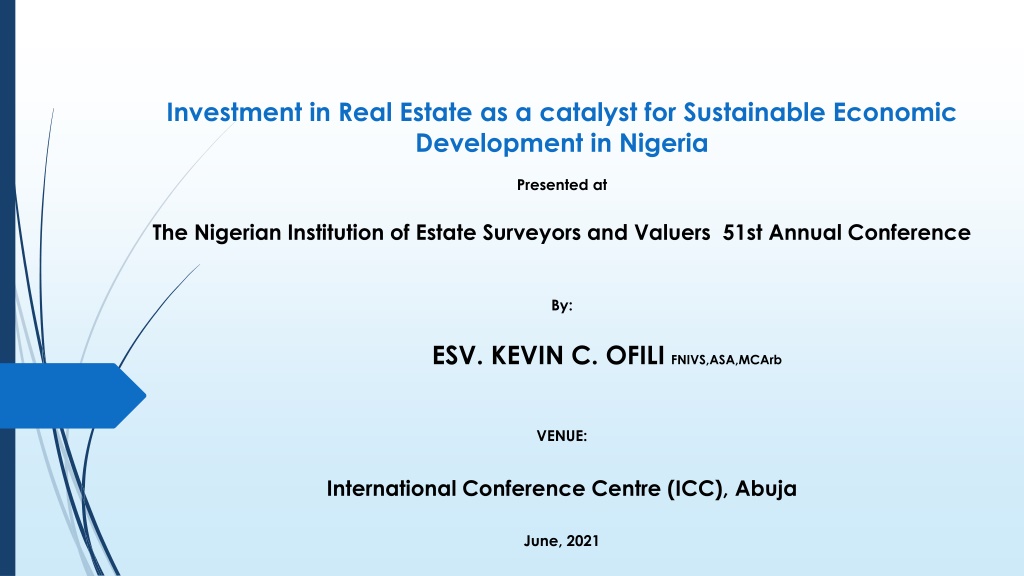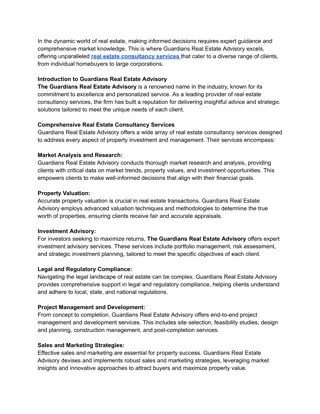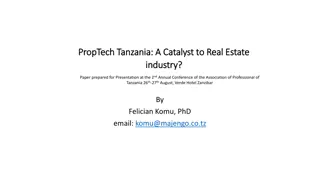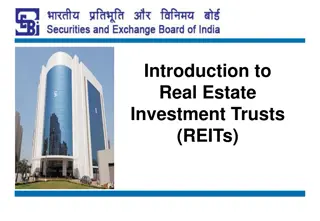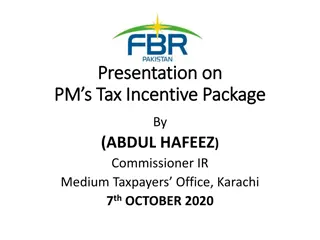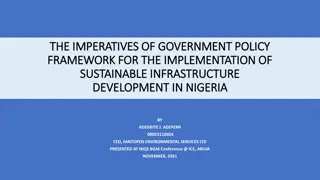Real Estate Investment as Catalyst for Sustainable Economic Development in Nigeria
Exploring the role of real estate investment in fostering sustainable economic development in Nigeria, this presentation highlights the significance of providing shelter as a basic human right, the overview of real estate, and its impact on the Nigerian economy amidst challenges such as the pandemic and currency devaluation.
Download Presentation

Please find below an Image/Link to download the presentation.
The content on the website is provided AS IS for your information and personal use only. It may not be sold, licensed, or shared on other websites without obtaining consent from the author. Download presentation by click this link. If you encounter any issues during the download, it is possible that the publisher has removed the file from their server.
E N D
Presentation Transcript
Investment in Real Estate as a catalyst for Sustainable Economic Development in Nigeria Presented at The Nigerian Institution of Estate Surveyors and Valuers 51st Annual Conference By: ESV. KEVIN C. OFILI FNIVS,ASA,MCArb VENUE: International Conference Centre (ICC), Abuja June, 2021
Introduction Over the years, man has identified his physiological needs as essentials for survival. These needs includes but are not limited to food, shelter, clothing and so on. It is upon this physiological needs of man that others stand. These needs are safety, social, esteem and self actualization (Abraham Maslow, 1943). To achieve and sustain these physiological needs of man, government (States and Federal) work each day towards attaining a just society. In order to guarantee these basic needs of its citizenry, governments as part of their primary function treat access to these essentials as basic human rights. These includes: Right to life Right to liberty Right to possess property One wonders what could be the whole essence of any government if she cannot assure her citizens shelter and the right to own it.
Real Estate OVERVIEW Real estate is a form of real property. It differs from personal property, which are things not permanently attached to the land, such as vehicles, boats, jewelry, furniture, and farm equipment. Real estate is the land along with any permanent (whether natural or artificial) improvements attached to the land. Natural attachments are part of the land and include trees, water, valuable mineral deposits, and oil whilst artificial improvements include dams, buildings, bridges, sidewalks, and fences. In Nigeria like in most part of the world, real Estate has been proven to be one of the most profitable and safest form of investment opportunities with relatively low volatility of returns. It involves the purchase, ownership, management, rental and/or sale of real estate for profit. Real estate investment in Nigeria attracts both local and foreign investors. While good performance in real sector is largely driven by middle-class and all government activities that aid development of robust middle class ultimately stimulate growth of active real estate investment .
Real Estate & Nigeria Economy Economic development is a broad term that generally refers to the sustained, concerted effort of policy makers and community to improve standard of living and economic health in a specific area. For Nigeria, our population has continued to grow rapidly and this has resulted to tremendous increase in demand for real estate. However, the current pandemic has negatively impacted this sector especially as regards real estate construction funding by developers and acquisition by first time home buyers. Another current challenge to the country s real estate sector is the continued devaluation of Naira, which resultant effect is rising cost of building materials, thereby making it harder to develop affordable houses. This liquidity challenge has somehow helped to manage price movement in Nigerian real estate market in the recent past thereby no experience of bubble despite the huge demand gap. When you take a look back at economic boom and bust cycles over the past century, you will find out that real estate was involved in most of them.
Some Indicators for Economic Development Let s look at some of the indicators of economic development in a country. They include but not limited to; Gross Domestic Product Poverty Index Consumer Price Index Purchasing Manager s Index Central Bank Minutes
Gross Domestic Product Gross Domestic product is the total of all value added created in an economy with a given period. The value added means the value of goods and services that have been produced minus the value of the goods and services needed to produce them. Real estate sector is a major contributors to a nation s GDP and the ability to increase its percentage contribution the better for any nation to obtain and sustain financial stability. Most Asian countries have very good real estate contribution to GDP and the effect was seen during the last global financial crisis of 2008, the Asian countries kept the world economic growth above waters because of the level of investments they have achieved in real estate sector in relation to other sectors of their economies. Governments in developed countries work on continuous basis to sustain positive real estate market conditions in order to achieve growth in their GDP. Note that an increase in the prices of properties generally encourages consumer spending and lead to higher economic growth, while a sharp drop in house prices adversely affects consumer confidence and construction activities which ultimately leads to lower economic growth.
Poverty Index Poverty is a state or condition in which a person or community lacks the financial resources and essentials required to living. Poverty means that the income level from employment is so low that basic human needs can't be met. attain a minimum standard of An individual is poor if that individual lives poverty line. below the Poverty index on the other hand measures the level of poverty in a society. In measuring the level of poverty, a poverty line or poverty threshold, usually stated in terms of income, is defined to divide the society into two separate groups.
Consumer Price Index Consumer price index (CPI) is a measure that examines the changes in the purchasing- power of a currency. It measures changes in the price level of market basket of consumer goods and services purchased by households. The movement of the Consumer Price Index is the main measure for inflation rate. An increase in CPI means that a household has to spend more Naira to maintain the same standard of living; that's mostly bad for the households, but it can be good for businesses and the government In January 2021, the Consumer Price Index in Nigeria stood at 361.2. Compared to January 2020, the CPI increased by 16.5 percent. This means that the inflation has been constantly increasing in the last months. In fact, Nigeria ranks as one of the countries with the highest inflation rate worldwide. It s every government priority to work very hard to keep consumer price index as low as possible as the effect of inflation when out of control can undermine any government in power.
Purchasing Managers Index The Purchasing Managers Index (PMI) is a measure of the prevailing direction of economic trends in manufacturing. The PMI is based on a monthly survey of supply chain managers across 19 industries, covering both upstream and downstream activity. The survey shows the change, if any, in the current month compared with the previous month. The PMI is presented as an average of variables with the following weights: Production level (25 percent), New orders (30 percent), Supplier deliveries (15 percent) and Employment level & inventories (20 percent). A reading above 50 indicates an expansion; below 50 represents a contraction; while 50 indicates no change. The Central Bank of Nigeria composite PMI for the manufacturing sector edged down to 49.6 in December of 2020 from 50.2 in November, pointing to a renewed contraction in the country's manufacturing activity.
Central Bank Minutes Central banks play a crucial role in ensuring economic and financial stability. They conduct monetary policy to achieve low and stable inflation. In the wake of the global financial crisis, central banks have expanded their toolkits to deal with risks to financial stability and to manage volatile exchange rates The Governor of the Central Bank of Nigeria, Godwin Emefiele recently said that a third of Nigeria's workforce are now out of work and the economy expanded just 0.11% in the fourth quarter 2020 . Also lower oil receipts have weakened its currency, the Naira, and inflation climbed to a four-year peak in February 2021 as food prices jumped more than 20%. Once a nation starts experiencing steady rise in month on month inflation figures, Few analysts expect the central bank to raise base rate, given Nigeria's low growth and high inflation. The general implication is that once a country s GDP in not growing, and CPI rising with lowering PMI, then expect central bank will increase interest rate while investor s will start to relocate their capital invested in the subject country.
Major Challenges Facing Nigeria Real Estate Sector Challenges are inevitable and most times avoidable, but it is the way and manner government respond to these challenges that matters. Developing Nigerian real estate sector is fraught with numerous challenges which impedes growth and can be discussed under the following headings: Land Acquisition difficulties in Urban Areas Government bureaucratic process with respect to title registration Poor Finance mobilization (Mortgage availability) Persistent rising cost of building materials Poor workers propensity to invest in real estate Taxation and Tariff Inadequate provision of basic infrastructure & Amenities Weak legal system to protect Investors
Land Acquisition difficulties in Urban Areas Nigerian Land Use Act vests ownership of all land in urban areas, except Federal Government land, to the state Governor to hold in trust for people who then has the right to grant statutory right of occupancy to individuals and organizations. However, practically in all urban areas in every State, the Governors are unable to provide developable lands at affordable rate to Nigerian citizens. Unfortunately, the little they are able to provide are usually fraught with very slow pace of title documentation, available evidence reveals it takes over 12months in most cases for allotees to obtain registered titles to their lands after effecting full payments to various State Governments in Nigeria. This restricted land ownership structure in Nigeria coupled with challenges of title registration creates dead capital as people cannot easily use their interest in land to create wealth. Government bureaucratic process with respect to title registration Although various State governments are meant to generate sustainable revenue from effective title documentation process as regards land related transactions, it is ironic that the same State governments in Nigerian as a matter of tradition still make this process very unattractive for their citizens by introducing a lot of bottleneck that end up discouraging unregistered land title holders from coming forward to perfect their titles
Poor Finance mobilization (Mortgage availability) Recent studies reveal that Nigeria has about 22 million housing deficit as at 2021, this shows that there is a huge gap between demand and supply for housing, owing to several challenges encountered in providing mortgages for low and middle -income earners that form the majority of prospective beneficiaries of the home ownership scheme initiated by Federal Mortgage Bank of Nigeria (FMBN). The key challenges facing Nigerian mortgage initiation by FMBN can be viewed in three broad ways namely; Financial - Low capitalization of the Bank to enable it face this huge housing financing gap for low to middle income earners. Process - This accentuates the rigorous processes that National Housing Fund applicants go through in Nigeria before they can obtain mortgage loans from FMBN. Political - manifesto talk less hear our media operator challenge them during their various media briefings. We hardly hear our politician talk about mortgage creation in their
Persistent rising cost of building materials Nigeria has not been able to address the challenge of importing majority of materials required by its citizens for finishing a building. Unfortunately, Naira has continue to fall in value in relation to other currencies used for her import transaction. The consequence of this poor economic management is the persistent rise in cost of building materials in Nigeria over the last few years, which shows no sign of improvement in the near future if the current trend is anything to go by. Poor workers propensity to invest in real estate With Nigerians ever experiencing persistent rise in the number of unemployed and underemployed population coupled with low monthly minimum wage ( less than $100USD), ability for these set of citizens to afford housing is almost mission impossible.
Taxation and Tariff Property based taxation is the best form of generating income by government in Nigeria but unfortunately, one of the greatest challenge with our various government is the inability to keep accurate data of housing stock especially in urban areas Again, in collecting these property based taxes from the few that submit their documents for processing, government will introduce different types of charges payable at different times and different offices on one transaction thereby causing tax payers a lot of inconveniences. Inadequate provision of basic infrastructure & Amenities For Nigeria to achieve an effective and functional real estate sector, the country must have a well articulated plan for basic housing infrastructure and amenities. These includes roads and drainages, electricity supply, portable water supply, sewage treatment and so on. It is pertinent to mention that even when these amenities are provided, the country lacks the integration plan to have their services synchronize with each other at both local and regional levels.
Weak legal system to protect Investors Nigerian judicial system has suffered and continues to suffer from poor funding. One of the consequential effects is delay in hearing and concluding disputes arising from different commercial real estate related business transactions. There is a saying that justice delayed is justice denied, real estate related businesses have suffered serious set backs in the different tiers in Nigeria court systems and most times at the end of these court processes no amount of remedies from the courts can adequately compensate for the time lost in real estate related litigations.
Why Nigeria Should Invest More in Real Estate According to Franklin D. Roosevelt, Former U.S. president Real estate cannot be lost or stolen, nor can it be carried away. Purchased with common sense, paid for in full, and managed with reasonable care, it is about the safest investment in the world. Investment in real estate is one of the most profitable venture for every economy and one of the major global indices for measuring level of economic growth and development. Fulfilment of basic human need Tax consideration Employment Creation Infrastructural development Increase success in other Economic Sector
Fulfilment of Basic Human Needs The major objective of any government is to protect lives and properties. For the Nigerian government to achieve this, a lot of planning and investment has to be made in the real estate sector to cater to its citizens needs. Investment in real estate sector helps provide shelter whichis a basic human need crucial for survival. Once Nigerian government can guarantee shelter for low to middle income earners, then there will be assurance on national security, personal safety and protection from the weather, and prevents ill health and disease. Adequate housing provides people with dignity and the opportunity to lead a normal life. Tax Consideration Property tax is a tax levied on land owned by a person or another legal body, such as a corporation. Property tax provides a basis for local autonomy and facilitates decentralization. It provides a revenue base for single function authorities. It encourages the economic use of land. It tends to reduce land and property prices thus facilitating access to land. For Nigeria to achieve her long time dream of economic diversification away from oil and gas, one of the viable alternative after agriculture is massive investment in real estate sector.
Employment Creation Construction is an important real estate sector that contributes greatly to the economic growth of a nation. Government and individuals contact the construction Industry to develop infrastructure related to housing, health, transport as well as education sector. Construction alone can produce thousands of jobs both for skilled and unskilled graduates. Ranging from architects to site engineers to surveyors, town planners, project managers, artisans and laborers all are engaged in the construction of residential, commercial or industrial properties. Which will, in turn, add to the GDP of the economy;
Infrastructural Development Generally, the level of infrastructure development in a country says a lot about its economic status. Unfortunately, the role of real estate in economic growth is overlooked in developing economies including Nigeria and thus its potential is often missed. The construction of Infrastructural development (road and rail transport infrastructure, telecommunications, properties, external accessibility of the region by land, air and water) act as an indicator of the factors of production, competitive conditions of region Efficient infrastructure supports economic growth, improves quality of life, and it is important for national security. For Nigeria to attain sanity especially in her major cities, serious investment must be carried out and sustained in developing horizontal transportation (railway transport) and vertical buildings (high rise buildings).
Success in other Sectors Because the real estate sector has strong connections with various sectors in the building materials industry such as tiles, paints, fittings & fixtures, cement & steel to mention a few, so prosperity in this sector means wealth for all other sectors, thereby positively impacting our country s economic growth. Although, like every other investment, real estate might experience ups and down at certain times, in the words of Theodore Roosevelt and Franklin D. Roosevelt. Every person who invests in a well selected real estate in a growing section of a prosperous community adopts the surest and safest method of becoming independent, for real estate is the basis of wealth. -- Theodore Roosevelt, U.S president Real estate cannot be lost or stolen, nor can it be carried away. Purchased with common sense, paid for in full, and managed with reasonable care, it is about the safest investment in the world. -- Franklin D. Roosevelt, U.S. president.
Conclusion To achieve and sustain these real estate investment objectives, Nigeria must continue to welcome new innovative real estate development initiatives from relevant professionals, embrace technology and where possible copy and adapt existing models from developed countries. In conclusion, I urge all of us listening today to work in any capacity we find our selves in Nigeria to encourage government at all levels for them to imbibe the spirit of investing in real estate sector of the country s economy as a recipe for speedy and sustainable growth and development of our beloved nation - Nigeria.
